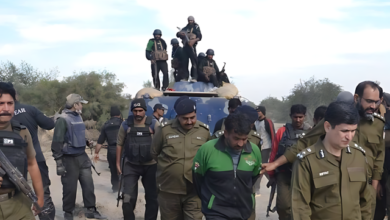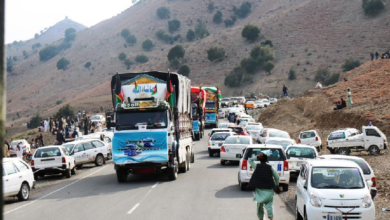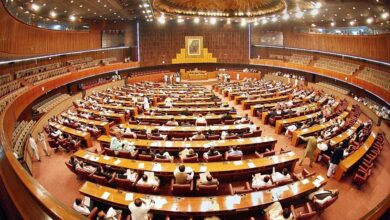Dharna report shrouded in mystery

ISLAMABAD:The saga surrounding the Faizabad dharna commission report remains shrouded in ambiguity, with the Attorney General for Pakistan (AGP) office denying any knowledge of its submission to the Supreme Court.
Speculation abounds regarding the whereabouts of the elusive report, with conflicting accounts further complicating the matter. While some assert that the commission had indeed forwarded the report to the federal government, others challenge this assertion.
A senior official in the AGP office disclosed to The Express Tribune that the report has yet to land on the Attorney General’s desk. Even AGP Mansoor Awan remains in the dark about its contents, he added.
The source elaborated that, theoretically, the commission should have handed over the report to the federal government.
However, rumors swirl that the report did land in the AGP office, only to be promptly returned for reasons shrouded in mystery. In contrast, one source asserts that a single copy of the report, along with a summary of its findings, has been lodged at the SC Registrar’s office.
Interestingly, a senior journalist possesses a copy of the report, while other members of the media are relying solely on excerpts from the summary outlining the commission’s conclusions.‘Damage has been done. Meanwhile, a senior lawyer asserts that the damage has already been done, and altering the report would only add to the embarrassment of the current government.
The inquiry commission concluded that the then Punjab government, under Shehbaz Sharif’s leadership, failed to quell the protesters’ sit-in.
However, former law minister Rana Sanaullah countered, stating that they refrained from taking coercive action against the protesters based on intelligence reports from security agencies, he added.
All eyes now turn to Chief Justice of Pakistan (CJP) Qazi Faez Isa, as anticipation mounts over his stance on implementing the February 2019 judgment regarding the Faizabad dharna. Currently presiding over the bench at the Lahore Registry, his decisions are eagerly awaited.
Senior lawyers speculate on the potential ramifications of the commission’s purported findings, which may have ripple effects on the narrative of Pakistan Muslim League Nawaz (PML-N), particularly regarding allegations of security establishment involvement in past protests.
The PML-N leaders have consistently blamed the security establishment for orchestrating protests against their government (2013-18). Moreover, CJP Isa found himself embroiled in the aftermath, with a presidential reference filed against him in response to the Faizabad dharna judgment.
In fact, the security establishment’s discontent with the judgment was palpable, leading to a meeting of senior lawyers in Rawalpindi to discuss its implications.
One of the participants of the meeting, talking to The Express Tribune, revealed that high-ranking officials within the security establishment were incensed by CJP Isa’s actions.
Subsequently, several government departments, including the Election Commission of Pakistan (ECP) and PEMRA, challenged it. However, the AGP office showed little interest in filing review petitions.
Curiously, the commission’s stance on the filing of review petitions remains undocumented. The inquiry commission was also tasked with investigating whether all the review petitions submitted by various government departments against the Faizabad Dharna judgment were coincidental or were filed pursuant to instructions from a single source. This was also explicitly mentioned in the Terms of Reference (TORs).
Likewise, senior journalist Absar Alam accused former senior military officer General Faiz Hameed of interference during his tenure as chairman of PEMRA.
He was asked by the SC to submit his statement before the inquiry commission, although the commission’s findings regarding Alam’s allegations remain undisclosed.
Meanwhile, the acceptance of the inquiry commission’s findings by the security establishment remains uncertain. While the commission purportedly absolved General Faiz Hameed, it also recommended limiting the military’s involvement in internal affairs and empowering the Intelligence Bureau (IB).
Legal experts assert that clarity will emerge following the official release of the report.




